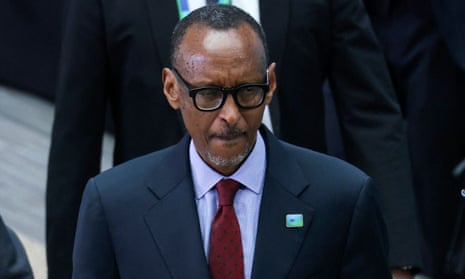Paul Kagame, the president of Rwanda, has suggested the UK extradite suspects wanted in the east African country for alleged roles in the 1994 genocide, after a controversial deal with the Home Office to process asylum seekers there.
Speaking less than two weeks after the deal was announced, Kagame told an audience of diplomats in Kigali that included the British high commissioner he hoped “that when the UK is sending us these migrants, they should send us some people they have accommodated for over 15 years who committed crimes [in Rwanda]”.
“We sent case files [to the UK] and … investigated. These are clear case files. Instead of being accommodated there in that beautiful place of [the] UK, they should be in jail, either in the UK or here,” Kagame said.
The presence in the UK of five men alleged to have played an active and important role in the killing of more than 800,000 ethnic Tutsis and some moderate Hutus over three months in Rwanda in 1994 has been an irritant in relations with Kigali for many years.
British judges have blocked extradition on the grounds the suspects would not receive a fair trial in Rwanda. Officials in Kigali have called for a trial in the UK instead.
All five, aged between 61 and 69, came to the UK in the immediate aftermath of the genocide where they applied for asylum. They deny the allegations against them.
The Home Office denied any link between the deal and the issue of extraditions.
“Any matters on extradition with Rwanda are not part of our migration and economic development partnership and to suggest otherwise would be completely wrong. This is an independent Metropolitan police inquiry and it would be inappropriate for us to comment further,” a spokesperson said.
However, the comments will raise concerns that the British government has made undisclosed promises to Kagame, or will find it more difficult to refuse pressure from Kigali on sensitive issues.
Under the deal, Rwanda will be paid an initial £120m to receive asylum seekers who arrive illegally in the UK. The full details of the agreement have not been made publicly available.
Weeks before the deal was announced, the government confirmed the appointment of Rwanda’s new ambassador to the UK, after a delay of eight months. Johnston Busingye, Rwanda’s long-serving justice minister, was named as the new envoy amid international scrutiny over the alleged “rendition” and trial of Paul Rusesabagina, the hotelier credited with saving many lives during the genocide – portrayed in the film Hotel Rwanda.
On 29 April, Busingye was received by the Queen at Buckingham Palace in a virtual audience.
In his speech, Kagame denied the deal with the UK meant Rwanda was “buying and selling people”. He said: “No, we don’t do that kind of thing. We can’t do that because of our core values …“When the UK approached us and because of a problem they have … we are happy to deal with that problem,” Kagame told the diplomats. “There is nothing bad about this … There is nothing we cannot be transparent about.”
Kagame’s reference to the five alleged genocide suspects may be embarrassing for the UK government and fuel criticism of the asylum deal.
In 2019, ministers told parliament the government was “not shielding any war criminals” and had spent £3m “trying to get the right outcome” on an investigation launched after the court rulings on extradition and requests from the Rwandan government.
Last year, MPs formed an all-party parliamentary group (APPG) on war crimes to “look into matters relating to the presence of alleged Rwandan war criminals in the UK and the prosecution of those who participated in the Rwandan genocide”.
In April last year, Busingye, as minister of justice, pledged that “Rwanda does not seek revenge” and that though extradition was denied, Rwanda had agreed to a trial by the UK courts.
“We are still watching and waiting, waiting for the one signal that will show the genocide victims, in their lifetime, that finally there is commitment to bring these fugitives to justice,” he said.
Rusesabagina was tricked into returning to Rwanda in August 2020, in what amounted to an enforced disappearance, a serious violation of international law, the New York-based Human Rights Watch said at the time. He was later convicted of involvement in a rebel group blamed for deadly attacks in Rwanda. A 25-year jail sentence was upheld by Rwanda’s court of appeal, a ruling his family says is in effect a death sentence for the ailing 67-year-old.
In his speech to the diplomats, Kagame criticised those whose understanding of Rwanda’s history was based on “a movie”, a reference to Hotel Rwanda. “He’s a hero, people say … But what about the families of the victims, people who were lost [at] the hands of this person and the group he led?” the president said.
Kagame became head of state in 2000 after he and his rebel forces halted the genocide in 1994 after 100 days of killing resulted in about 800,000 deaths. He brought stability, security and economic growth to a shattered country but has also been accused of running a repressive, authoritarian state.








